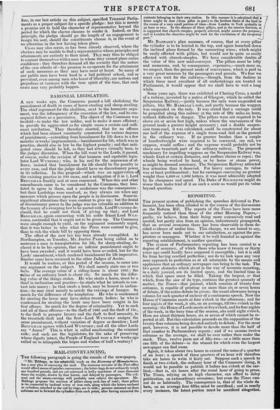BARONIAL LEGISLATION.
A FEW weeks ago, the Commons passed a bill abolishing the punishment of death in cases of horse-stealing and sheep-stealing. The chief argument for the abolition, next to the humanity argu- ment, was the infrequency of the execution of the law, and its con- sequent failure as a preventive. The object of the Commons was twofold—to make the law milder, and to make it more efficient ; to provide for aggravated as for simple cases a certain and suffi- cient retribution. They therefore enacted, that for an offence which had been almost constantly commuted for various degrees of punishment, —extending from banishment for life down to a few months' or weeks' imprisonment, —banishment for life, which was in practice, should also in law be the highest penalty; and that miti- gated cases should be left, as they had always virtually been, to the judges' discretion. When the bill went to the Lords, it passed, of course, under the revision of' that humane and equitable legis- lator Lord WysiForto ; who, in his zeal for the repression of of- fence, insisted that banishment for life should be the penalty in every case, and that the judge should have no discretionary power in its infliction. In this proposal—which was an aggravation o the existing practice in 999 cases, and a mitigation of it in 1, Lord 7 Bacitipsiasi frankly and at once concurred. When this and other - amendments came to be considered by the Commons, they hesi- tated to agree in them, and a conference was the consequence : but their Lordships were resolved, as they always are when any measure which presses upon the people is in discussion. Somd in- significant alterations they were content to give up; but the denial of discretionary power to the judge was too valuable an addition to the tyranny of a sweeping law to be parted with. LordWvissoan de- clared, that he could not think of giving up that ; and Lord BROUGHAM, again concurring with his noble friend Lord Wyx- FORD, contended that it ought not to be given up. The Commons were simple enough to yield, on the argument commonly urged, that it was better to take what the Peers were content to give, than to risk the whole bill by opposing them. The effect of the new law has been already exemplified. At Northampton, on Tuesday, Mr. Justice PARK being called on to sentence a man to transportation for life, for sheep-stealing, de- clared it to be his opinion, that an inferior punishment ought to have been awarded; and it would have been awarded, but for the Lords' amendment, which rendered banishment for life imperative. Similar cases have occurred to the other Judges of Assize.
It would be useless, at this period of the session, to enter into any argument on the subject. We shall merely state one or two facts. The average value of a riding-horse is about 100/.; the value of an ordinary lamb is about 10s. So much for the differ- ing value of the things stolen. He who steals a horse, must be a thief in inclination and practice—he steals what he intends to con- vert into money ; he that steals a lamb, may be honest in inclina- tion—he may steal merely to satisfy the cravings of hunger. So much for the difference of the temptation. He who is condemned for stealing the horse may have stolen twenty before; he who is condemned for stealing the lamb may have been caught in his first offence. So much for the degree of criminality. Yet to each and all of these offences—to the theft of 100/. and the theft of 10s., to the theft to pamper luxury and the theft to feed necessity, to the twentieth theft and the first—Lord WYNFORD assigns the same punishment, without variation of degree or duration ; Lord BROUGHAM agrees withLord WYNFORD ; and all the other Lords say "Amen!" This is what is called ameliorating the criminal cede; and such are the legislators, for the sake of preserving whose dignity intact, the People of England were a few weeks ago called on to relinquish the hopes and wishes of half a century!



























 Previous page
Previous page